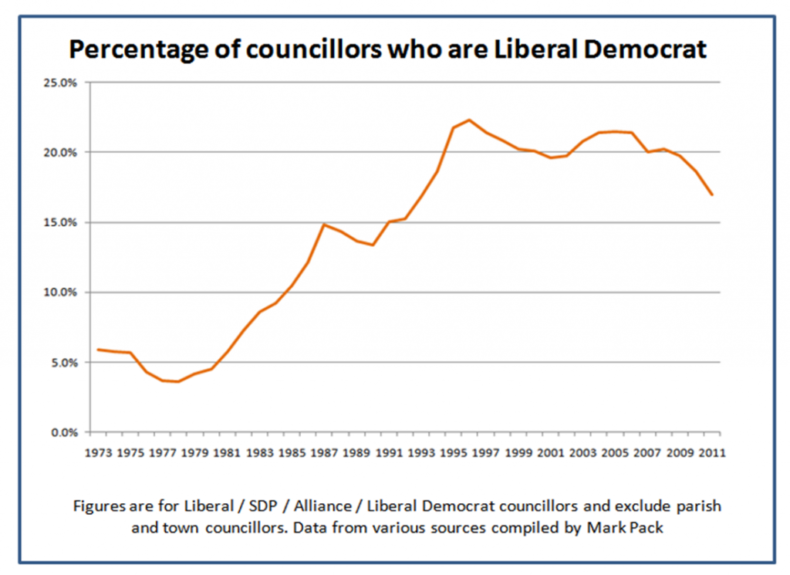Learning the lessons from last week #4: The Lib Dem local government base matters
Broadly speaking, the party’s local government base is now back to where it was in 1993. As I put it:
For those who joined the Liberal Democrats in the last 18 months, and may not yet even have been in school in 1993, that may well seem a long time away and a big step back; for those who have seen the party’s ups and downs in the ’70s, ’80s, ’90s and ’00s, 1993 looks rather better – and nothing like as bad as the dog days of having a party leader on trial for conspiracy to murder (late 1970s) or the fiasco of the fallout from the Liberal/SDP merger (late 1980s).
But the reason we’re back to 1993 levels is not simply about May 5th 2011, it’s also about our election results over the last fifteen years – because the Liberal Democrat local government base (measured in terms of the proportion of councillors in the UK who are Lib Dem) has been becalmed or slipping for some time:

The party’s councillor base matters because it’s the heart of our grassroots campaigning (despite the occasional frustrations of councillors who treat campaigning like I treat the idea of a week without chocolate), councils can be huge forces for good and it’s how day by day we can show people the difference community politics can make in their street and their community.
It’s also home to some of our most talented people – those who have combined delivering high quality services with winning elections year after year. Yet people such as the teams in Eastleigh (council leader – Keith House) and in Three Rivers (council leader – Ann Shaw), where The Voice’s own Sara Bedford is also a councillor, are largely unsung heroes in the party.
Just as a minister sitting in Whitehall can’t realistically expect to control the details of services around the country, so someone sat at the top of the party can’t single-handedly grow the party’s local government base across the country.
But there is more that could and should be done – including extending the tentative first steps of improving internal communications between ministers and councillors, having Tim Farron and Simon Hughes lead from the front in strongly championing the importance of our local government base, encouraging and supporting new activists and by returning to talking about community politics.
That theme, on which I’ve written before, is also lesson number four from last week – for which see tomorrow’s blog post.
What went wrong with the LibDems who run Stockport then? http://www.sheilaoliver.org/sk-solutions.html, http://www.sheilaoliver.org/no-playing-fields.html, http://www.sheilaoliver.org/financial-irregularities.html, http://www.sheilaoliver.org/not-big-enough-one-year-on.html, http://www.sheilaoliver.org/sandringham-road-planning-shambles.html, http://www.sheilaoliver.org/m56-to-a6-bypass.html, http://www.sheilaoliver.org/nps-stockport.html, http://www.sheilaoliver.org/town-hall-protester.html